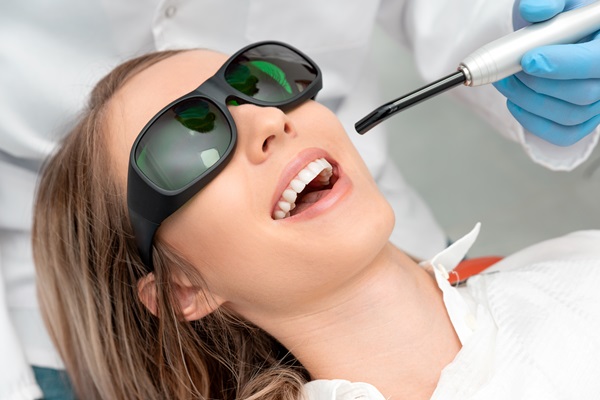See a Laser Dentist for a Painless Treatment

A laser dentist can perform dental procedures with better accuracy and effectiveness. Read on to learn about laser dentistry and how it can help make some treatments more comfortable. The field of dentistry has witnessed significant advancements in the last few years. New technologies are transforming what dentists are able to offer their patients, from sedation procedures that ease anxiety to laser dentistry for virtually pain-free dental treatment.
What is a laser dentist and can they make treatments painless?
Laser dentistry is a cutting-edge form of dentistry that is revolutionizing the way people think about dental treatments. For example, when patients visited the dentist for oral surgery or other dental care in the past, they frequently anticipated pain, bleeding, and other side effects. Today, laser dentistry has enabled patients to stay comfortable and calm during dental procedures.
Laser dentistry is a painless, minimally invasive procedure that usually does not require an anesthetic or stitches. Furthermore, there is seldom any bleeding, and the laser is practically silent, so there are no drilling or spinning sounds, which are sometimes linked with uncomfortable dental procedures for some patients.
For the laser dentist to complete precise dental operations, they will use a powerful beam of light energy. They are simple to handle and allow dentists to cut or vaporize tissue on touch, remove soft tissues from the gums, and remove decayed tissue in the teeth. Since the high-energy laser beam cauterizes as it works, blood loss is reduced, shortening the recovery period and the need for over-the-counter pain relievers.
Why laser dentistry is painless
Traditional methods are far more intrusive than this high-energy laser technology. Today, many dental treatments are no longer performed using drills and scalpels, minimizing the need for anesthetic. Laser dentistry even makes biopsies and cavity fillings painless.
All treatments are conducted with excellent accuracy to preserve the surrounding tissues, and there are no sutures to deal with after the procedure. Additionally, lasers sterilize as they work, lowering the chance of unpleasant bacterial infections.
Applications of laser dentistry
Laser dentistry is most commonly utilized for gum treatments, though it may be used on hard and soft tissue. Some of the following conditions can be treated using laser dentistry: gum disease, gum inflammation, gingivectomies, gum reshaping, and cavities. Laser dentistry can also assist with crown preparation, inlays, onlays, treat root canal infection, removal of old fillings, and wisdom tooth treatment.
The safety of laser dentistry
Laser dentistry is safe for individuals who are afraid of dental operations, including children. Laser dentistry is frequently used to address dental issues in children. The laser is a groundbreaking device that will make children look forward to going to the laser dentist. Both children and adults typically prefer no-drill, no-shot laser dentistry.
Ready to schedule an appointment?
A laser dentist can give you a comfortable, nearly painless dental experience, thanks to laser dentistry. To book an appointment and learn more about laser treatments, contact our dental office today.
Request an appointment here: https://www.1dentalwellness.com or call Dental Wellness at (605) 274-6191 for an appointment in our Sioux Falls office.
Check out what others are saying about our dental services on Google: Laser Dentistry in Sioux Falls, SD.
Related Posts
Laser dentistry became commercially available in 1989. Since then, it has grown significantly in popularity and is now the preferred form of treatment for millions of patients across the United States and worldwide. Dental lasers are used to treat a range of oral health concerns, including cavities, gum disease, and oral infections. Here, we focus…
Wanting some quality information on laser dentistry? Specifically how it can be used to clean your teeth? Great idea. Clean teeth are an essential part of you having a healthy mouth. When plaque and tartar build up on your teeth over a period of time it will begin to cause damage to your teeth. And…
Your cosmetic dentist can reshape your teeth to improve your dental health and appearance. This can even enhance your general health. Bonding material allows the dentist to provide you with a better dental shape. Here are the details on how a cosmetic dentist can reshape your teeth with dental bonding.A chipped edge and dental staining…
An experienced cosmetic dentist can brighten and whiten your teeth again. Lifestyle and diet choices can contribute to dental staining. In some cases, medications cause teeth to discolor. Bringing the sparkle back to them is important for your self-esteem. Here are the teeth whitening options that you can get from your cosmetic dentist.Over-the-counter teeth whitening…
